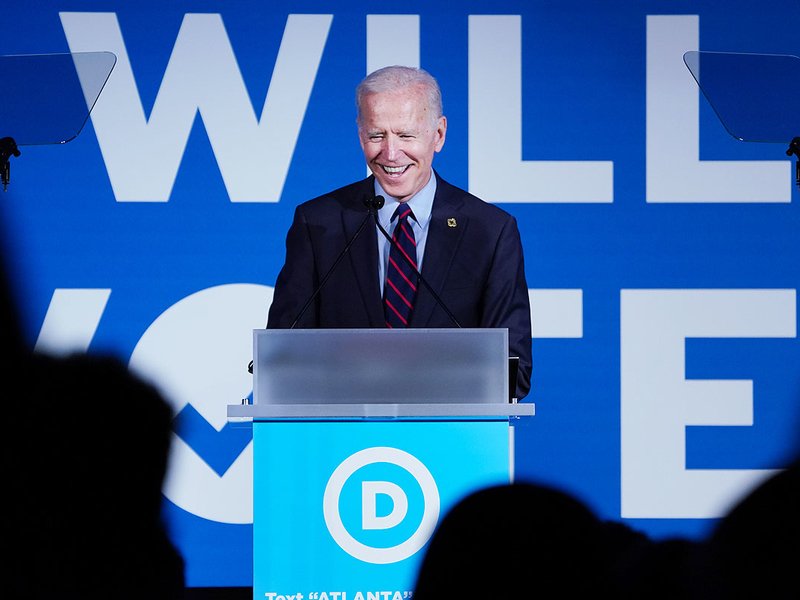
WASHINGTON — President-elect Joe Biden is meeting Monday with the CEOs of General Motors and Microsoft, as well as key labor leaders, as he begins to outline the economic agenda for his administration.
Mary Barra of GM and Satya Nadella of Microsoft are among the business leaders joining him for a video meeting on how business and labor can work together, Biden’s transition office said. Labor officials participating in the conversation include Richard Trumka of the AFL-CIO and Rory Gamble of the UAW, as well as a number of other labor leaders.
“We have a lot of problems facing us,” Biden told participants at the beginning of a video conference from his home state of Delaware seen by reporters. “It’s going to take all of us working together.”
Biden started the meeting speaking about his love of Corvettes with Barra and Gamble, whose union represents some of the automaker’s employees. Biden then switched to a more somber tone as he addressed the “pretty dark” state of the economy because of the coronavirus.
“General Motors was pleased to participate in this important discussion with President-Elect Biden and Vice President-Elect Harris and others from the business and labor community,” GM said in a statement Monday.
“Mary Barra took the opportunity to share our best practices for keeping our workforce safe and factories running during the pandemic. We look forward to working with the new administration and incoming Congress on policies that support our customers, dealers and employees, help strengthen our manufacturing presence in the United States and advance our vision of an all-electric, zero-emissions future.”
Biden will inherit an economy that has suffered millions of job losses during a pandemic that has killed more than 246,000 people in the United States. U.S. COVID-19 cases have surged as Biden prepares to take office on Jan. 20.
“We’re going into a very dark winter. Things are going to get much tougher before they get easier,” Biden said of the pandemic.
“As you battle COVID, we have to make sure that businesses and workers have the tools, the resources and the national guidance and health and safety standards to operate safely,” Biden added.
He called for bipartisan cooperation and urged Congress to pass pandemic relief legislation. Talks on such legislation stalled for months before the election.
Biden discussed how workers and businesses can operate safely to rebuild the economy amid the coronavirus downturn, his transition said. He discussed how the economy and the virus are interconnected and that the virus must be contained in order to get the economy back on track.
Brian Cornell of Target Corp. and Sonia Syngal of Gap Inc. were also scheduled to meet with Biden. Others include Mary Kay Henry, president of Service Employees International Union; Marc Perrone, president of the United Food and Commercial Workers and Lee Saunders, president of the American Federation of State, County and Municipal Employees.
The Biden administration’s economic plan is based on the “Build Back Better” proposals offered during the campaign. The campaign proposal included $2 trillion in spending on clean energy and infrastructure. The goal is to create millions of jobs building the wind turbines, sustainable homes and electric vehicles needed to rapidly throttle U.S. greenhouse gas emissions driving climate change.
Biden also laid out a $700 billion “Buy American” manufacturing plan that would include $400 billion in additional federal purchases of products made by American workers over the course of his first term as well as $300 billion for federally funded r&d. In all, the Biden campaign estimates that its proposals on manufacturing and buying American will create 5 million jobs.
He has also called it a moral and economic necessity for the government to better support those who care for children and the elderly, proposing spending $775 billion over 10 years that would add jobs and boost pay for caregivers, eliminate the waiting list for home and community care under Medicaid and provide preschool for all 3- and 4-year-olds.
Moody’s estimated the total cost of Biden’s campaign proposals — including additions to the health care system — at $7.269 trillion over a decade and projected that the package would create 18.6 million jobs, seven million more than President Donald Trump’s economic plans.
Much of Biden’s plan would be funded through increased taxes on corporations and the rich, but his team also expects that a few trillion dollars would be characterized as stimulus spending and wouldn’t be offset by new tax revenue.
Bloomberg, Reuters and Automotive News contributed to this report.